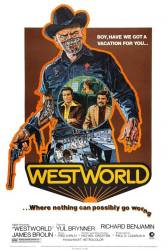Continuity mistake: During the first gunfight between The Gunslinger (Yul Brynner) and Peter (Richard Benjamin), The Gunslinger is seen being shot in the middle of the body from the back. But, when you see him a second or two later, the shot is well over on his right side.
Continuity mistake: At the end when the gunslinger is on fire for quite a while most of him and his clothes are burned. Later when he falls off the stairs and gets up without his face and then short circuits, most of his shirt, belt and trousers are in pristine condition.






Suggested correction: The explanation given in the TV show would seem to easily apply to the original film as well: guests can be injured, but not to the point that it would leave a lasting mark. The park has access to futuristic medical techniques, so they can heal most non-life-threatening injuries easily. Also the guests almost certainly sign waivers, so in the event of serious injury the park isn't liable.
Suggested correction: It's easy to nitpick the factual details of "Westworld," the screenplay of which was written on-the-fly on a fairly limited budget, even by early 1970s' standards. Author Michael Crichton (who also wrote "The Andromeda Strain," "The Terminal Man," "Congo," "Sphere," "Jurassic Park" and several other technological thrillers) himself acknowledged that Westworld was more a visual story (like a comic book) than a cerebral piece of science fiction, and he learned on this movie that suspension of disbelief outweighed technical or even factual details, if he wanted to expedite the story in an hour-and-a-half. Crichton said he was having more fun and devoting more time to shooting the film than actually writing it, comparing the experience to playing cowboys and indians as a child. So, yes, Westworld is not much more than an adult fantasy with a number of plot holes that we are supposed to gleefully overlook, rather than analyze.
Charles Austin Miller
Except for blatant continuity mistakes you just invalidated every single entry on this site.
Suggested correction: Westworld ensure that any interactions with the robots are entirely safe for the patrons of the park. They cannot prevent humans fighting amongst themselves, just as Disneyland can't prevent people fighting there. People are also injured or die all the time in horse-riding accidents, but that won't lead to people suing Westworld. Due to the nature of the park, all the guests likely sign a waiver stating that any injuries are not the fault of the park.
Utter rubbish. Guests who were completely innocent bystanders could be killed or injured by the actions of other guests, notably in the bar brawl or by the explosion used in the jailbreak. We see one guest smash a barstool against the back of another guest - not a robot - which could easily have broken his spine. There is no question whatever that the owners and managers of the park would be held liable in this and many other cases, just as amusement park owners and managers nowadays are held liable when roller coasters or other rides go awry, injuring or killing guests.
The most plausible explanation would be a waiver that visitors to the park have to sign. The waiver would explain that while the robots cannot harm humans, other humans can, and the park is not held responsible. In the event of death or serious injury, the guest who caused it would face criminal charges and possibly a civil lawsuit. But a waiver would protect the park. Also, the rules of the park may be similar to those in the HBO Westworld series, where the robots cannot cause a "permanent mark", meaning they can injure guests as long as the injury is repairable.